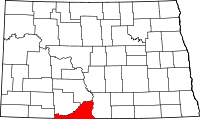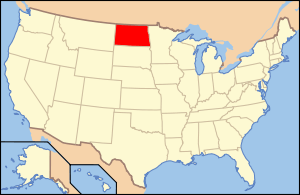Sioux County, North Dakota
| Sioux County, North Dakota | |
|---|---|
 Location in the U.S. state of North Dakota | |
 North Dakota's location in the U.S. | |
| Founded | September 12, 1914 |
| Named for | Sioux people |
| Seat | Fort Yates |
| Largest community | Cannon Ball |
| Area | |
| • Total | 1,128 sq mi (2,922 km2) |
| • Land | 1,094 sq mi (2,833 km2) |
| • Water | 34 sq mi (88 km2), 3.0% |
| Population (est.) | |
| • (2015) | 4,370 |
| • Density | 3.8/sq mi (1/km²) |
| Time zones |
Central: UTC-6/-5 (eastern portion) |
|
Mountain: UTC-7/-6 (western portion) | |
Sioux County is a county located along the southern border of the U.S. state of North Dakota. As of the 2010 census, the population was 4,153.[1] Its eastern border is the Missouri River and its county seat is Fort Yates.[2] The county was created by proclamation of Governor Louis B. Hanna on September 3, 1914 and named after the Native American Lakota, whose historic territory included this area and much more. The county government was first organized on September 12, 1914.[3][4]
The county lies entirely within the Standing Rock Indian Reservation, forming the northernmost 30 percent of the reservation. (The balance of the reservation is in South Dakota). It is the only county in North Dakota that is entirely within an Indian reservation.
Sioux County is included in the Bismarck, ND Metropolitan Statistical Area.
Geography
According to the U.S. Census Bureau, the county has a total area of 1,128 square miles (2,920 km2), of which 1,094 square miles (2,830 km2) is land and 34 square miles (88 km2) (3.0%) is water.[5]
Major highways
 North Dakota Highway 6
North Dakota Highway 6 North Dakota Highway 24
North Dakota Highway 24 North Dakota Highway 31
North Dakota Highway 31 North Dakota Highway 49
North Dakota Highway 49
Adjacent counties
- Morton County (north)
- Emmons County (east)
- Corson County, South Dakota (south)
- Adams County (west)
- Grant County (northwest)
National protected area
Demographics
| Historical population | |||
|---|---|---|---|
| Census | Pop. | %± | |
| 1920 | 3,308 | — | |
| 1930 | 4,687 | 41.7% | |
| 1940 | 4,419 | −5.7% | |
| 1950 | 3,696 | −16.4% | |
| 1960 | 3,662 | −0.9% | |
| 1970 | 3,632 | −0.8% | |
| 1980 | 3,620 | −0.3% | |
| 1990 | 3,761 | 3.9% | |
| 2000 | 4,044 | 7.5% | |
| 2010 | 4,153 | 2.7% | |
| Est. 2015 | 4,370 | [6] | 5.2% |
| U.S. Decennial Census[7] 1790-1960[8] 1900-1990[9] 1990-2000[10] 2010-2015[1] | |||
2000 census
As of the census of 2000, there were 4,044 people, 1,095 households, and 871 families residing in the county. The population density was 4 people per square mile (1/km²). There were 1,216 housing units at an average density of 1 per square mile (0/km²). The racial makeup of the county was 84.59% Native American, 14.34% White, 0.02% Black or African American, 0.02% Asian, 0.05% Pacific Islander, 0.07% from other races, and 0.89% from two or more races. 1.61% of the population were Hispanic or Latino of any race. 11.5% were of German ancestry.
There were 1,095 households out of which 48.90% had children under the age of 18 living with them, 39.10% were married couples living together, 29.10% had a female householder with no husband present, and 20.40% were non-families. 16.60% of all households were made up of individuals and 4.40% had someone living alone who was 65 years of age or older. The average household size was 3.63 and the average family size was 3.98.
In the county the population was spread out with 40.30% under the age of 18, 11.10% from 18 to 24, 26.90% from 25 to 44, 16.20% from 45 to 64, and 5.60% who were 65 years of age or older. The median age was 24 years. For every 100 females there were 104.20 males. For every 100 females age 18 and over, there were 99.70 males.
The median income for a household in the county was $22,483, and the median income for a family was $24,000. Males had a median income of $22,039 versus $19,458 for females. The per capita income for the county was $7,731. About 33.60% of families and 39.20% of the population were below the poverty line, including 44.40% of those under age 18 and 25.80% of those age 65 or over. The county's per-capita income makes it one of the poorest counties in the United States.
2010 census
As of the 2010 United States Census, there were 4,153 people, 1,158 households, and 900 families residing in the county.[11] The population density was 3.8 inhabitants per square mile (1.5/km2). There were 1,311 housing units at an average density of 1.2 per square mile (0.46/km2).[12] The racial makeup of the county was 84.1% American Indian, 12.6% white, 0.2% black or African American, 0.1% Asian, 0.1% from other races, and 2.9% from two or more races. Those of Hispanic or Latino origin made up 2.0% of the population.[11] In terms of ancestry, 13.5% were German, and 0.3% were American.[13]
Of the 1,158 households, 54.1% had children under the age of 18 living with them, 32.5% were married couples living together, 31.6% had a female householder with no husband present, 22.3% were non-families, and 17.4% of all households were made up of individuals. The average household size was 3.55 and the average family size was 3.89. The median age was 26.3 years.[11]
The median income for a household in the county was $30,990 and the median income for a family was $31,098. Males had a median income of $31,894 versus $26,619 for females. The per capita income for the county was $13,542. About 39.0% of families and 47.2% of the population were below the poverty line, including 58.4% of those under age 18 and 36.1% of those age 65 or over.[14]
Communities
Cities
- Fort Yates (county seat)
- Selfridge
- Solen
Township
- Menz
Census-designated places
See also
References
- 1 2 "State & County QuickFacts". United States Census Bureau. Retrieved November 1, 2013.
- ↑ "Find a County". National Association of Counties. Retrieved 2011-06-07.
- ↑ "County History". Official Portal for North Dakota State Government. Retrieved 4 May 2011.
- ↑ "Dakota Territory, South Dakota, and North Dakota: Individual County Chronologies". Dakota Territory Atlas of Historical County Boundaries. The Newberry Library. 2006. Retrieved February 1, 2015.
- ↑ "2010 Census Gazetteer Files". United States Census Bureau. August 22, 2012. Retrieved February 1, 2015.
- ↑ "County Totals Dataset: Population, Population Change and Estimated Components of Population Change: April 1, 2010 to July 1, 2015". Retrieved July 2, 2016.
- ↑ "U.S. Decennial Census". United States Census Bureau. Retrieved February 1, 2015.
- ↑ "Historical Census Browser". University of Virginia Library. Retrieved February 1, 2015.
- ↑ Forstall, Richard L., ed. (April 20, 1995). "Population of Counties by Decennial Census: 1900 to 1990". United States Census Bureau. Retrieved February 1, 2015.
- ↑ "Census 2000 PHC-T-4. Ranking Tables for Counties: 1990 and 2000" (PDF). United States Census Bureau. April 2, 2001. Retrieved February 1, 2015.
- 1 2 3 "DP-1 Profile of General Population and Housing Characteristics: 2010 Demographic Profile Data". United States Census Bureau. Retrieved 2016-04-03.
- ↑ "Population, Housing Units, Area, and Density: 2010 - County". United States Census Bureau. Retrieved 2016-04-03.
- ↑ "DP02 SELECTED SOCIAL CHARACTERISTICS IN THE UNITED STATES – 2006-2010 American Community Survey 5-Year Estimates". United States Census Bureau. Retrieved 2016-04-03.
- ↑ "DP03 SELECTED ECONOMIC CHARACTERISTICS – 2006-2010 American Community Survey 5-Year Estimates". United States Census Bureau. Retrieved 2016-04-03.
 |
Grant County | Morton County |  | |
| Adams County | |
Emmons County | ||
| ||||
| | ||||
| Corson County, South Dakota |
Coordinates: 46°07′N 101°03′W / 46.11°N 101.05°W
